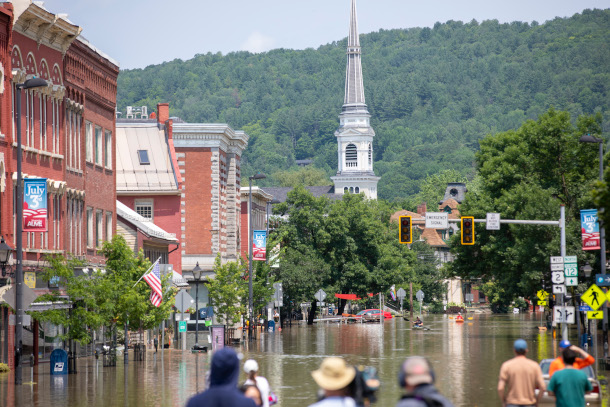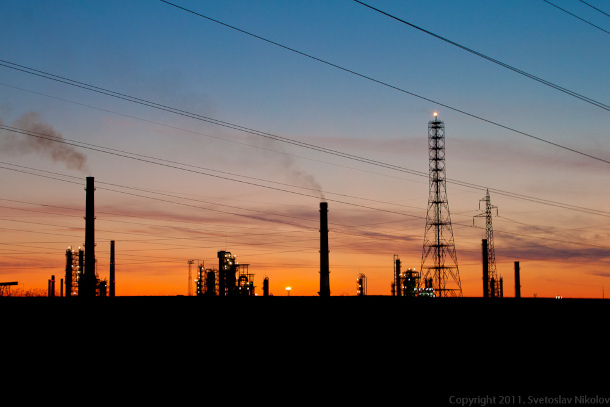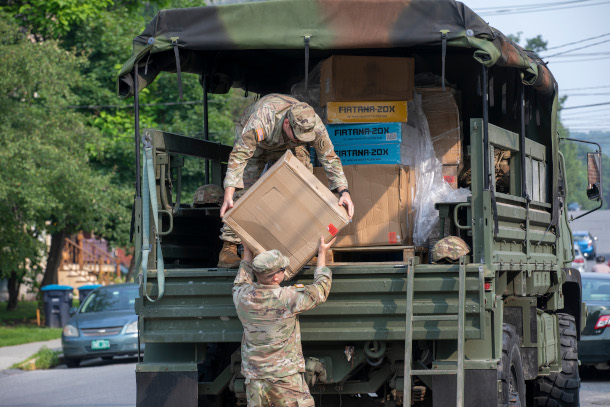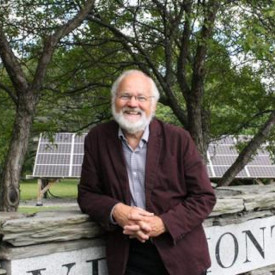Vermont's "Climate Superfund" Bill
Air Date: Week of May 24, 2024

A flood in July 2023 left Vermont’s capital Montpelier underwater for weeks, causing more than $1 billion in damages. (Photo: The National Guard, Flickr, CC BY 2.0)
Facing costly climate impacts such as the billion-dollar flood disaster of July 2023, Vermont is seeking to make fossil fuel companies pay. Vermont Law and Graduate School Emeritus Professor Pat Parenteau joins Host Paloma Beltran to discuss the state’s “Climate Superfund” bill and its potential influence.
Transcript
O’NEILL: From PRX and the Jennifer and Ted Stanley Studios at the University of Massachusetts Boston, this is Living on Earth. I’m Aynsley O’Neill.
BELTRAN: And I’m Paloma Beltran.
Vermont’s House and Senate have approved a bill that would make fossil fuel companies financially liable for their carbon pollution and its role in the climate crisis. Lawmakers pointed to consequences of these carbon emissions, like the flood in July of 2023 that put parts of the state capital underwater for weeks and caused over a billion dollars in damage. The bipartisan bill is known as the Climate Superfund Act because it demands that fossil fuel companies cover at least part of the growing costs of climate change. Similar bills are being considered in New York, Massachusetts and Maryland, but Vermont is the first state to pass this kind of legislation. The bill passed with a supermajority enough to override a potential veto. It is now headed to Governor Phil Scott’s desk. Pat Parenteau, former EPA regional counsel and emeritus professor at Vermont Law and Graduate School, joins us now to discuss. Welcome back to Living on Earth, Pat!
PARENTEAU: Thanks, Paloma. Good to be with you.
BELTRAN: So Pat, what is the Climate Superfund law in Vermont? And what does it say?
PARENTEAU: It's basically asking fossil fuel companies to contribute to the costs for adaptation to the unavoidable impacts of climate change, including protection of homes and businesses threatened by flooding, building resilience in floodplains by moving structures out of harm's way, investing in wetland protection and natural systems that absorb carbon emissions and provide for more resilience to extreme weather events. So it's a new approach, and Vermont is the first state in the country to try it.
BELTRAN: And how is this law different from the climate deception lawsuits like the one we've seen filed in the state of Hawaii?
PARENTEAU: So this law doesn't depend on proof of deception, or false advertising, or the campaign to sow doubt about climate change that the companies are accused of in over 30 lawsuits actually, across the country. The companies are liable by virtue of what they do. It's not that they've committed anything wrong, necessarily, it's just "polluter pays" is the concept here. So the fact that your product creates carbon pollution, which is driving climate change, that's enough to make you liable, in the same way, or at least a similar way, to how the Superfund law at the federal level makes you responsible for contamination of soil and groundwater as a result of your activities at a site. You may have generated chemical waste that wound up at the site, you may own the site, you may operate a landfill or other facility that's become contaminated. And the Superfund law says, by virtue of the fact that you own or operate or generated waste, you're liable. In the same way, this law is saying the fact that you extract and burn fossil fuels is enough to make you liable for the damage that results from that.

Vermont’s Climate Superfund Act demands that fossil fuel companies contribute to paying for climate change adaptation and mitigation in the state. (Photo: Svetoslav Nikolov, Flickr, CC BY-SA 2.0)
BELTRAN: And we're talking about money here, Pat. So how might the state of Vermont go about calculating which companies owe what? What are the possible methods they could use here?
PARENTEAU: Right, that is the big question. The formula that the law is using—and the state treasurer will have to flesh this out—is to say, what is the individual company's share in the global emissions? The law also directs the state to use the Environmental Protection Agency's greenhouse gas inventory as a starting point. And the greenhouse gas inventory has something called emission factors. For example, for the big oil companies, they can disaggregate among the different companies what their emissions factor is for the amount of oil and gas they're producing. So it's going to be a proportionate share, based on what the individual company's emissions are, that's going to be the basic formula.
BELTRAN: That's a big job, to calculate all of that.
PARENTEAU: Yes. And then from there, you have to say, well, what percentage of harm is the emissions doing on top of the natural cycle of flooding, for example, just sticking with the flooding example. There are other impacts, of course, of climate change in Vermont. There's impacts on the ski industry, there's impacts on the sugar making industry, our famous syrup, for example, there's lots of different impacts. But just in terms of flooding, you know, what you have to calculate is by how much has climate change increased the damage from flooding that normally would occur in Vermont? The flooding of Montpelier was definitely much greater than any prior flood we'd ever had. But you have to calculate how much worse was it as a result of the emissions from these companies? That's another tricky calculation.

Vermont’s ski industry has also been affected by climate change and could potentially require assistance from a superfund. (Robbie Shade, Flickr, CC BY 2.0)
BELTRAN: And how are these oil companies expected to respond?
PARENTEAU: Well, we know that the oil companies are not going to start sending checks to Vermont. The oil companies have been fighting tooth and nail against all of the other lawsuits that have been brought against them. And we can expect the same thing here. The companies have a choice to make. They can either file what's called a preemptive strike and challenge the law on constitutional grounds, for example, they may argue that this is a violation of due process to make them liable, when they haven't, quote, done anything wrong. They're producing a valuable product that people are still buying, of course, to put into their automobiles, to heat their homes and so forth. And so they're gonna say, you're making us liable for engaging in economic activity that's lawful? How can you do that? That's not constitutional. Similar arguments were made against Superfund, the federal law. And it took a while, took several years for those arguments to finally be resolved in the court. Ultimately, it went all the way to the U.S. Supreme Court. And in the Superfund case, there is precedent for establishing liability for the damage that legal activity, but nevertheless, is causing damage. But whether that precedent under Superfund extends to the climate liability context, that's going to be a major issue, that's a novel issue. So one option for the companies might be to challenge the law on its face. The other option would be to wait until Vermont actually sends them a bill in effect, right, a demand for payment, and then not pay, in which case Vermont would have to initiate a lawsuit to collect the money that they've demanded. So either way, this issue is sure to end up in court. And it will take, of course, the usual long time for it to finally get settled.
BELTRAN: And, Pat, what are some of the concerns raised by opponents of the law other than these oil companies?

Some opponents of the bill argue that Vermont should use state resources to directly help affected communities, rather than pay for years of litigation with fossil fuel companies. (Photo: The National Guard, Flickr, CC BY 2.0)
PARENTEAU: The opposition to passage of the law came from those who are concerned that Vermont is too small a state to take on these major—multinational, really—corporations, that, as we've just discussed, this isn't going to just happen without litigation. And the litigation that's underway in other states now has shown just how expensive it is to sue these companies. These companies really fight hard, which means the cost of litigation can be measured easily in the millions. So some of the people who questioned this law, were saying, Vermont is too small to take this on, let some of the bigger states do it, let New York do it. And we can follow in their wake, right, but don't take the first hit from these companies. And so those costs of litigating against the oil companies, not only are they not small, but there's not enough money in Vermont to do everything that needs to be done. So that's the big question is, what's the best use of the money we have? Is it to fight the oil companies to try to get them to pay? There's a good case to be made that that's appropriate. But the contrary case is, that's going to take a really long time, with uncertain results. And so maybe the better approach is to spend the money you do have with direct assistance to the communities most affected by climate change, and let some of these other states go first.
BELTRAN: What do you think are the broader consequences of this law in Vermont? How will this impact the rest of the country and potentially the rest of the globe?

Pat Parenteau is emeritus professor of law at Vermont Law School and formerly served as EPA Regional Counsel. (Photo: Courtesy of Vermont Law and Graduate School)
PARENTEAU: I do think we're going to see other states adopting similar legislation. And I do think the underlying theory of these laws, that the oil companies should pay their fair share to address the damage that's being done, even if their product was a valuable product for many years, the truth is, we now know, it's causing damage. And under the "polluter pay" rule, which is one of the pillars of environmental law and policy, really, what Vermont is doing and what I think many other states are going to be doing is looking to the oil companies, which are some of the wealthiest companies on earth, to pay their fair share for the damage that's being done. So in that sense, I think this movement that Vermont has begun has merit. And I think it will put greater pressure on the oil companies to either agree under some circumstances to contribute to the costs of dealing with climate or be forced to do so by a court at some point. So I think there's a legal and a moral case to be made for holding companies responsible. And we'll now see how fast that can happen.
BELTRAN: Pat Parenteau is former EPA regional counsel and emeritus professor at Vermont Law and Graduate School. Thank you, Pat, for joining us.
PARENTEAU: Thank you, Paloma. It's a pleasure.
BELTRAN: We reached out to the American Petroleum Institute for comment and they responded in part, quote: “This bill is nothing more than an unnecessary new fee on American energy that would only stall the innovative progress underway to accelerate low-carbon solutions while delivering the energy communities need.” To read the full response, head on over to our website, loe.org.
--
FULL STATEMENT FROM THE AMERICAN PETROLEUM INSTITUTE: “America’s natural gas and oil industry is working to address climate change and build a lower carbon future, while simultaneously meeting the world’s growing energy needs. This bill is nothing more than an unnecessary new fee on American energy that would only stall the innovative progress underway to accelerate low-carbon solutions while delivering the energy communities need.” – Scott Lauermann, API Spokesperson
--
Links
Living on Earth wants to hear from you!
Living on Earth
62 Calef Highway, Suite 212
Lee, NH 03861
Telephone: 617-287-4121
E-mail: comments@loe.org
Newsletter [Click here]
Donate to Living on Earth!
Living on Earth is an independent media program and relies entirely on contributions from listeners and institutions supporting public service. Please donate now to preserve an independent environmental voice.
NewsletterLiving on Earth offers a weekly delivery of the show's rundown to your mailbox. Sign up for our newsletter today!
 Sailors For The Sea: Be the change you want to sea.
Sailors For The Sea: Be the change you want to sea.
 The Grantham Foundation for the Protection of the Environment: Committed to protecting and improving the health of the global environment.
The Grantham Foundation for the Protection of the Environment: Committed to protecting and improving the health of the global environment.
 Contribute to Living on Earth and receive, as our gift to you, an archival print of one of Mark Seth Lender's extraordinary wildlife photographs. Follow the link to see Mark's current collection of photographs.
Contribute to Living on Earth and receive, as our gift to you, an archival print of one of Mark Seth Lender's extraordinary wildlife photographs. Follow the link to see Mark's current collection of photographs.
 Buy a signed copy of Mark Seth Lender's book Smeagull the Seagull & support Living on Earth
Buy a signed copy of Mark Seth Lender's book Smeagull the Seagull & support Living on Earth

